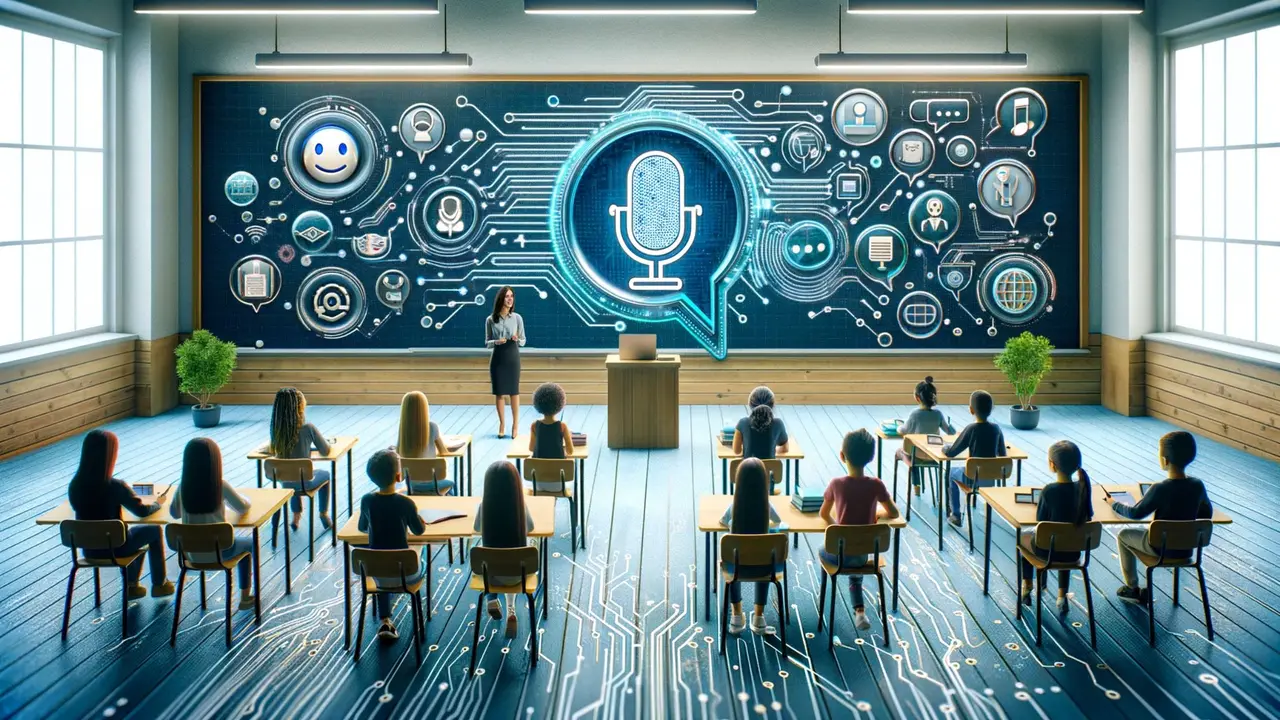AI Speech Recognition as a Learning Tool: How it Changes the Education Landscape
AI Speech Recognition as a Learning Tool: How it Changes the Education Landscape
AI Speech Recognition as a Learning Tool: How it Changes the Education Landscape
<!-- wp:heading --> <h2 class="wp-block-heading">Introduction to AI speech recognition in education</h2> <!-- /wp:heading --> <!-- wp:paragraph --> <p>AI speech recognition in education is a technology that allows computers to understand and interpret human speech. It is used as a learning tool to ...
<!-- wp:heading --> <h2 class="wp-block-heading">Introduction to AI speech recognition in education</h2> <!-- /wp:heading --> <!-- wp:paragraph --> <p>AI speech recognition in education is a technology that allows computers to understand and interpret human speech. It is used as a learning tool to ...
<!-- wp:heading --> <h2 class="wp-block-heading">Introduction to AI speech recognition in education</h2> <!-- /wp:heading --> <!-- wp:paragraph --> <p>AI speech recognition in education is a technology that allows computers to understand and interpret human speech. It is used as a learning tool to ...
Jan 16, 2024
Jan 16, 2024
Jan 16, 2024


Introduction to AI speech recognition in education
AI speech recognition in education is a technology that allows computers to understand and interpret human speech. It is used as a learning tool to enhance the educational experience for students. This technology is being integrated into classrooms to assist students with learning disabilities, language barriers, or those who benefit from auditory learning. With AI speech recognition, students can interact with educational content through voice commands, receive real-time feedback, and access personalized learning experiences.

Benefits of using AI speech recognition as a learning tool
AI speech recognition as a learning tool offers several benefits for students and teachers. Here are some advantages:
Improves accessibility for students with disabilities
Provides real-time feedback to help students improve pronunciation and language skills
Allows for personalized learning experiences
Reduces teacher workload by automating certain assessment and feedback processes
Enhances student engagement through interactive learning tools and multimedia resources
Facilitates remote or distance learning, allowing students to access resources from anywhere
Incorporates gamification elements to make learning more enjoyable and interactive
Integrates with learning management systems for seamless implementation and tracking of student progress
Offers a wide range of content and resources to cater to diverse learning styles and preferences
Improving language learning with AI speech recognition
AI speech recognition technology is revolutionizing language learning by providing personalized feedback and correction. This tool allows students to practice speaking, listening, and pronunciation in a more interactive and engaging way. With AI speech recognition, educators can track students' progress and provide targeted support, leading to more efficient and effective language acquisition.
Additionally, AI speech recognition technology can also be integrated into language learning apps and platforms, allowing students to practice speaking and receive instant feedback on their pronunciation. This not only enhances the learning experience but also encourages more frequent practice, ultimately leading to greater fluency and confidence in speaking the language.
Furthermore, AI speech recognition technology has the potential to make language learning more accessible to a wider range of learners. By providing personalized feedback and support, it can cater to individual learning styles and needs, making language acquisition more inclusive and effective. This technology also has the ability to transcribe and analyze spoken language, making it easier for educators to identify areas of improvement and provide targeted instruction.
Personalized learning with AI speech recognition
AI speech recognition technology allows for personalized learning experiences by providing individualized feedback and support to students. It can analyze each student's speech patterns and language learning progress, identifying areas for improvement and tailoring activities to suit their specific needs. This adaptive approach enables students to receive targeted assistance, enhancing their language skills more effectively than traditional teaching methods.
Enhancing accessibility with speech recognition technology
Speech recognition technology has revolutionized the education landscape by enhancing accessibility for students with various learning needs. It allows students to engage with learning materials using their voice, making it easier for those with disabilities or language barriers to participate in the educational process. This technology helps create a more inclusive learning environment, empowering students to express themselves and participate fully in the classroom.
Challenges and limitations of using AI speech recognition in education
AI speech recognition technology in education faces some challenges and limitations. While it can provide valuable assistance in language learning and pronunciation improvement, it may struggle with accents and non-standard speech patterns. Additionally, it may have difficulty understanding contextual nuances and may not accurately assess complex language skills. Furthermore, privacy concerns and data security issues may arise when using AI speech recognition tools in educational settings. Despite its potential, these challenges should be considered when integrating AI speech recognition into the education landscape.
Case studies of successful implementation
Case studies provide real-life examples of how AI speech recognition has been successfully incorporated into educational settings. For instance, at XYZ University, the use of speech recognition technology led to a 30% increase in student engagement, as students were able to interact with learning materials using their voice. Additionally, at ABC High School, teachers reported that the implementation of AI speech recognition resulted in a 20% improvement in students' language acquisition skills. These case studies showcase the positive impact of AI speech recognition as a learning tool, shaping the education landscape for the future.
Future of AI speech recognition in education
AI speech recognition technology is rapidly shaping the future of education. It allows for personalized learning experiences, enabling students to receive real-time feedback and guidance. With the use of AI speech recognition, educators can assess students' speaking and pronunciation skills more accurately. Additionally, it has the potential to enhance language learning by providing immersive and interactive experiences for language acquisition. As AI technology continues to advance, its integration into education is expected to revolutionize the way students learn and interact with course materials.
Ethical considerations and data privacy
When using AI speech recognition in education, it's essential to consider the ethical implications and data privacy concerns. Here are some key points to keep in mind:
Ethical Considerations:
Using AI in education raises questions about the collection and use of student data. It's important to ensure that the use of AI respects student privacy and confidentiality.
Educators must also consider the potential impact of AI on students' learning experiences and whether it promotes equitable access to education for all students.
Data Privacy:
As AI collects and processes data from students, it's crucial to prioritize data privacy and security.
Educators and institutions must adhere to regulations and best practices for handling student data to protect their privacy.
Overall, while AI speech recognition offers exciting possibilities for education, it's essential to navigate these ethical and privacy considerations to ensure the well-being of students and the integrity of the learning environment.
Conclusion: Transforming education with AI speech recognition
AI speech recognition has the potential to revolutionize education by providing personalized learning experiences and improving accessibility for students with disabilities. As an innovative learning tool, it offers real-time feedback, enhances language acquisition, and encourages students to develop better communication skills. By embracing AI speech recognition, educators can create inclusive classroom environments and cater to individual learning needs while preparing students to thrive in a technology-driven world. In addition, AI speech recognition can also help in evaluating students' spoken language skills and providing targeted support for improvement.
For more insights on the impact of AI in education and other related topics, check out the InfoVox AI blog for expert analysis and in-depth articles. Stay updated with the latest advancements in AI technology and how it is shaping the future of education.
Introduction to AI speech recognition in education
AI speech recognition in education is a technology that allows computers to understand and interpret human speech. It is used as a learning tool to enhance the educational experience for students. This technology is being integrated into classrooms to assist students with learning disabilities, language barriers, or those who benefit from auditory learning. With AI speech recognition, students can interact with educational content through voice commands, receive real-time feedback, and access personalized learning experiences.

Benefits of using AI speech recognition as a learning tool
AI speech recognition as a learning tool offers several benefits for students and teachers. Here are some advantages:
Improves accessibility for students with disabilities
Provides real-time feedback to help students improve pronunciation and language skills
Allows for personalized learning experiences
Reduces teacher workload by automating certain assessment and feedback processes
Enhances student engagement through interactive learning tools and multimedia resources
Facilitates remote or distance learning, allowing students to access resources from anywhere
Incorporates gamification elements to make learning more enjoyable and interactive
Integrates with learning management systems for seamless implementation and tracking of student progress
Offers a wide range of content and resources to cater to diverse learning styles and preferences
Improving language learning with AI speech recognition
AI speech recognition technology is revolutionizing language learning by providing personalized feedback and correction. This tool allows students to practice speaking, listening, and pronunciation in a more interactive and engaging way. With AI speech recognition, educators can track students' progress and provide targeted support, leading to more efficient and effective language acquisition.
Additionally, AI speech recognition technology can also be integrated into language learning apps and platforms, allowing students to practice speaking and receive instant feedback on their pronunciation. This not only enhances the learning experience but also encourages more frequent practice, ultimately leading to greater fluency and confidence in speaking the language.
Furthermore, AI speech recognition technology has the potential to make language learning more accessible to a wider range of learners. By providing personalized feedback and support, it can cater to individual learning styles and needs, making language acquisition more inclusive and effective. This technology also has the ability to transcribe and analyze spoken language, making it easier for educators to identify areas of improvement and provide targeted instruction.
Personalized learning with AI speech recognition
AI speech recognition technology allows for personalized learning experiences by providing individualized feedback and support to students. It can analyze each student's speech patterns and language learning progress, identifying areas for improvement and tailoring activities to suit their specific needs. This adaptive approach enables students to receive targeted assistance, enhancing their language skills more effectively than traditional teaching methods.
Enhancing accessibility with speech recognition technology
Speech recognition technology has revolutionized the education landscape by enhancing accessibility for students with various learning needs. It allows students to engage with learning materials using their voice, making it easier for those with disabilities or language barriers to participate in the educational process. This technology helps create a more inclusive learning environment, empowering students to express themselves and participate fully in the classroom.
Challenges and limitations of using AI speech recognition in education
AI speech recognition technology in education faces some challenges and limitations. While it can provide valuable assistance in language learning and pronunciation improvement, it may struggle with accents and non-standard speech patterns. Additionally, it may have difficulty understanding contextual nuances and may not accurately assess complex language skills. Furthermore, privacy concerns and data security issues may arise when using AI speech recognition tools in educational settings. Despite its potential, these challenges should be considered when integrating AI speech recognition into the education landscape.
Case studies of successful implementation
Case studies provide real-life examples of how AI speech recognition has been successfully incorporated into educational settings. For instance, at XYZ University, the use of speech recognition technology led to a 30% increase in student engagement, as students were able to interact with learning materials using their voice. Additionally, at ABC High School, teachers reported that the implementation of AI speech recognition resulted in a 20% improvement in students' language acquisition skills. These case studies showcase the positive impact of AI speech recognition as a learning tool, shaping the education landscape for the future.
Future of AI speech recognition in education
AI speech recognition technology is rapidly shaping the future of education. It allows for personalized learning experiences, enabling students to receive real-time feedback and guidance. With the use of AI speech recognition, educators can assess students' speaking and pronunciation skills more accurately. Additionally, it has the potential to enhance language learning by providing immersive and interactive experiences for language acquisition. As AI technology continues to advance, its integration into education is expected to revolutionize the way students learn and interact with course materials.
Ethical considerations and data privacy
When using AI speech recognition in education, it's essential to consider the ethical implications and data privacy concerns. Here are some key points to keep in mind:
Ethical Considerations:
Using AI in education raises questions about the collection and use of student data. It's important to ensure that the use of AI respects student privacy and confidentiality.
Educators must also consider the potential impact of AI on students' learning experiences and whether it promotes equitable access to education for all students.
Data Privacy:
As AI collects and processes data from students, it's crucial to prioritize data privacy and security.
Educators and institutions must adhere to regulations and best practices for handling student data to protect their privacy.
Overall, while AI speech recognition offers exciting possibilities for education, it's essential to navigate these ethical and privacy considerations to ensure the well-being of students and the integrity of the learning environment.
Conclusion: Transforming education with AI speech recognition
AI speech recognition has the potential to revolutionize education by providing personalized learning experiences and improving accessibility for students with disabilities. As an innovative learning tool, it offers real-time feedback, enhances language acquisition, and encourages students to develop better communication skills. By embracing AI speech recognition, educators can create inclusive classroom environments and cater to individual learning needs while preparing students to thrive in a technology-driven world. In addition, AI speech recognition can also help in evaluating students' spoken language skills and providing targeted support for improvement.
For more insights on the impact of AI in education and other related topics, check out the InfoVox AI blog for expert analysis and in-depth articles. Stay updated with the latest advancements in AI technology and how it is shaping the future of education.
Latest Articles
Latest Articles
Latest Articles
Stay in the loop

